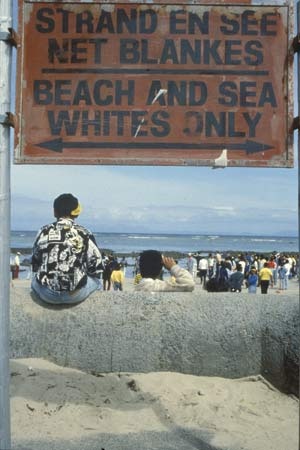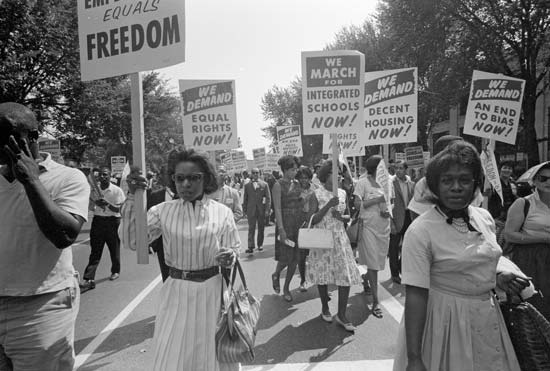racism
also called racialism
 any action, practice, or belief that reflects the racial worldview—the ideology that humans are divided into separate and exclusive biological entities called "races," that there is a causal link between inherited physical traits and traits of personality, intellect, morality, and other cultural behavioral features, and that some races (race) are innately superior to others.
any action, practice, or belief that reflects the racial worldview—the ideology that humans are divided into separate and exclusive biological entities called "races," that there is a causal link between inherited physical traits and traits of personality, intellect, morality, and other cultural behavioral features, and that some races (race) are innately superior to others.In North America and apartheid South Africa, racism dictated that different “races” should be segregated from one another, that they should have their own distinct communities and develop their own institutions such as churches, schools, and hospitals, and that it was unnatural for members of two “separate races” to intermarry.
Those who practice racism also hold that only low-status jobs should go to low-status races (African Americans and Indians in North America, blacks and Coloureds in South Africa) and that members of the economically and culturally dominant race alone should have access to privileges, political power, economic resources, high-status jobs, and unrestricted civil rights. The lived experience of racism for members of low-status races can include daily insults and frequent acts and verbal expressions of contempt and disrespect, all of which have profound effects on social relationships.
Racism was at the heart of North American slavery and the colonization and empire-building activities of western Europeans, especially in the 18th century. The idea of race was invented to magnify the differences between people of European origin in the United States and those of African descent whose ancestors had been involuntarily enslaved and transported to the Americas. By projecting Africans and their descendants as lesser human beings, the proponents of slavery attempted to justify and maintain this system of exploitation while at the same time portraying the United States as a bastion and champion of human freedom, with human rights, democratic institutions, unlimited opportunities, and equality. The contradiction between slavery and the ideology of human equality, accompanying a philosophy of human freedom and dignity, seemed to demand the dehumanization of those enslaved.
By the 19th century, racism had matured and spread around the world. In many nations, leaders began to think of the ethnic components of their own societies, usually religious or language groups, in racial terms and to designate higher and lower races. Those seen as the low-status races, especially in colonized areas, were exploited for their labour and re-sources, and discrimination against them became a common pattern in many areas of the world. The expressions and feelings of racial superiority that accompanied colonialism (colonialism, Western) generated resentment and hostility from those who were colonized and exploited, feelings that continued even after independence.
In the last half of the 20th century many conflicts around the world were interpreted in racial terms even though their origins were in the ethnic hostilities that have long characterized many human societies (e.g., Arabs and Jews, English and Irish). Racism reflects an acceptance of the deepest forms and degrees of divisiveness and carries the implication that differences among groups are so great that they cannot be transcended.
Racism elicits hatred and distrust and precludes any attempt to understand the racialized Other. For this reason most human societies have concluded that racism is wrong, at least in principle, and social trends have moved away from racism. Many societies have begun to combat institutionalized racism by denouncing racist beliefs and practices and promoting human understanding in public policies, as does the Universal Declaration of Human Rights, set forth by the United Nations in 1948.
 In the United States, racism came under greater attack during the civil rights movement of the 1950s and '60s, and laws and social policies designed to keep races separated were gradually eliminated. Private beliefs and practices of many people, however, remain racist, and some group of assumed lower status is often made a scapegoat. Because, in the popular mind, “race” is linked to physical differences among peoples, and such features as dark skin colour have been seen as markers of low status, some experts believe that racism may be difficult to eradicate. Indeed, minds cannot be changed by laws; but beliefs about human differences can and do change, as do all cultural elements.
In the United States, racism came under greater attack during the civil rights movement of the 1950s and '60s, and laws and social policies designed to keep races separated were gradually eliminated. Private beliefs and practices of many people, however, remain racist, and some group of assumed lower status is often made a scapegoat. Because, in the popular mind, “race” is linked to physical differences among peoples, and such features as dark skin colour have been seen as markers of low status, some experts believe that racism may be difficult to eradicate. Indeed, minds cannot be changed by laws; but beliefs about human differences can and do change, as do all cultural elements.- Cherenkov radiation
- Cherepovets
- Cherie Booth
- Sir John McEwen
- Sir John McKenzie
- Sir John Monash
- Sir John Moore
- Sir John Morris-Jones
- Sir John Mortimer
- Sir John Murray
- Sir John Murray, Baronet
- Sir John Northcote, 1st Baronet
- Sir John Oldcastle
- Sir John Perrot
- Sir John Philip Sargent
- Sir John Pringle, 1st Baronet
- Sir John Pritchard
- Sir John R. Hicks
- Sir John Richardson
- Sir John Robert Vane
- Sir John Ross
- Sir John Ross Marshall
- Sir John Sealy Edward Townsend
- Sir John Simon
- Sir John Soane